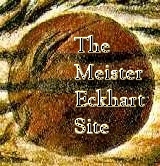|
|
||
 |
Meister Eckhart Home / Works by Meister Eckhart - Quotes / Inspired by Eckhart / Studies / The Papal Condemnation / Mail & Announcements / Links / Books |
AMY HOLLYWOOD
From: M. Rubin, W. Simons (ed.), The Cambridge History of Christianity, v. 4, Christianity in Western Europe, c. 1100 - c. 1500, Cambridge 2009 (Pages 297-307).
Page 4
Transcendence
Many of the debates about whether Augustine was a mystic circle around whether he himself claimed to have achieved an experience of the divine or of union with the divine. The Confessions offer clear evidence that he did, but many within the Augustinian tradition continue to be wary about claims to union with the divine. A number of crucial issues are at stake in these debates. The first, of concern more to modern scholars of mysticism than to medieval theologians, is whether mysticism – a term not available in its substantive form within the Middle Ages [4] – involves experiences simply of God's presence or of union with God.
If claims are made to the latter, as they often are within medieval texts, is this union one in which the soul maintains its own identity or is the soul submerged into the divine? And finally, what is the best way for one to achieve union, however it is understood? Does one come to union through knowledge or love – the mind or the heart – or some combination of the two?
[4] On the history of the terms 'mystic', 'mystical', and 'mysticism', see Louis Bouyer, 'Mysticism: An Essay on the History of the Word', in Richard Woods, ed. , Understanding Mysticism (Garden City, N. Y. : Image Books, 1980), 42–55; and Michel de Certeau, "Mystique" au XVIIe siècle: Le problème du langage "mystique"', in L'homme devant Dieu: Mélanges offerts au Père Henri de Lubac (Paris: Aubier, 1964), vol. 2, 267–91.